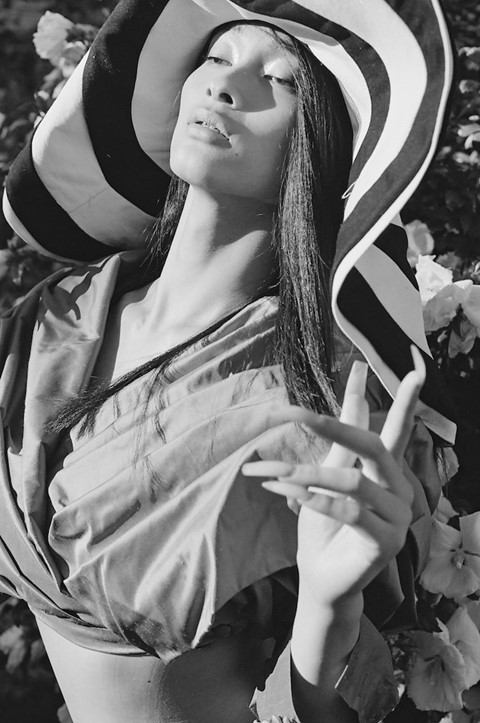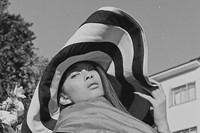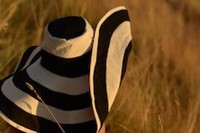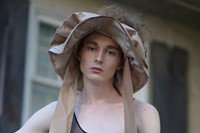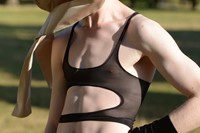Vancouver-based designer Sara Armstrong talks us through her “baroque vampire” aesthetic and her undying love for Rick Owens
- Who is it? Sara Armstrong is a Vancouver-based designer with a self-confessed “baroque vampire” aesthetic.
- Why do I want it? Sculptural, versatile, inclusive clothes designed without gender in mind.
- Where can I find it? Coming soon to sararmstrong.com.
Who is it? “I think of it as like a baroque vampire, who lived until the frontier and then died but was revived in the 1970s,” says Vancouver-based designer Sara Armstrong of her aesthetic. Elaborating, she adds, “It has to have menswear qualities, but then it's got to be rock ‘n’ roll, fantastical and opulent.” It’s a style embodied by the designer herself – suits are her favoured attire – but so are biker shirts. On her arms is a smorgasbord of tattoos, one a hand-sewing needle she got inked with when she was at school, another a boot designed by close friend, photographer and former Dazed fashion editor, Tyler Udall.
Armstrong literally has fashion in her sleeves, and lives it daily: designing for her own label, instructing fashion students at Vancouver’s Blanche Macdonald Centre and working as a pattern-cutter and tailor for major studio productions when they come to shoot in the film-friendly city. The Canadian designer’s clothes are sumptuous and romantic while also highly technical and structured – like the Zorro-inspired outfit in midnight blue worn by Olympic fencer and model Miles Chamley-Watson in a recent shoot. Standout garments include form-fitting cut-out knits that hug the body in sinuous, sculptural shapes, a block-printed polka dotted 1970s-style suit, and beautifully cut dresses in Days of Heaven colours, styled to ooze outlaw attitude.
Originally trained as an artist and sculptor, Armstrong’s work is centred on construction. “I always say if I had a superpower, it would be to see through buildings, because that’s how my brain works,” she says. Questions she will ask herself while designing include, “What can I take away and still have a garment stand?” Or “what can I add to create a new shape?”
Her transition from sculpture to fashion happened organically. “I really wanted to do more public sculpture. And for me, that was fashion, in some ways, because fashion can be public sculpture and it also can be video and sound.” Rick Owens is an important inspiration. “I like the way he thinks of his work and the way he speaks about his work, how he’s created this planet,” she says, citing a video of Owens in his studio that she watches often. “I'm always thinking about it, where he says, ‘I like things a little ascetic’. That’s sort of what I try to do, reel myself in every now and then when the other side of my brain is like, more ruffles!”
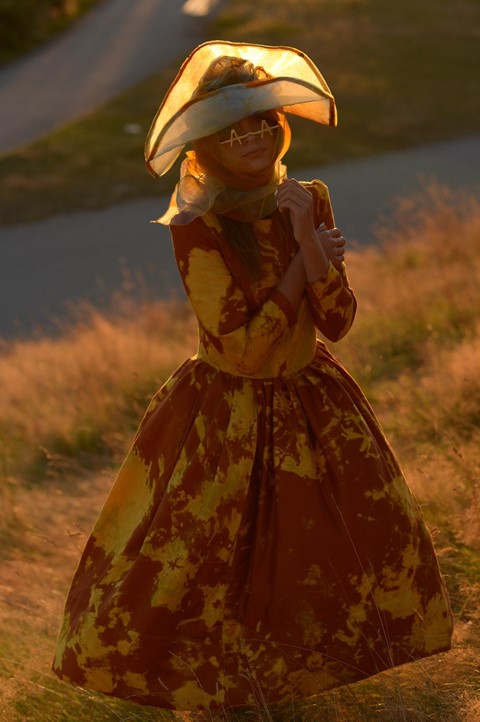
Why do I want it? Versatility and inclusivity are important to Armstrong, and she wants her clothes to go beyond the prescribed idea that gender neutral necessarily equals menswear. “I don’t actually believe in menswear or womenswear so much in my own work, as it’s just, like, design. And whoever puts it on is whoever it was made for,” she avers. Her work is sustainable by dint of its design – slow fashion, whether made to measure or easily adjustable to last longer. For her collection The Practice – an ode to the work that scaffolds the creative life – she used cloth from under her cutting table and stripped fabrics of dyes, giving light to the colours beneath. Whimsical elements inflect her work too, like brilliant custom sunglasses with letter ‘A’ frames, made for Armstrong by her boyfriend, metal fabricator Travis McLelland. And the clothes are created for movement, like the pieces worn by contemporary choreographer Kate Franklin in a short film shot on the shores of Tsawwassen Beach, south of Vancouver, for The Practice.
Structured yet fluid on the body and dramatic without being ostentatious – Armstrong’s clothing dances a tightrope of seeming paradoxes, and makes it work.
Where can I find it? Coming soon to sararmstrong.com
